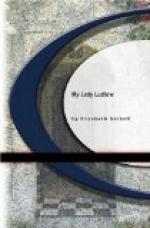But a great change was to come first. Before Sir Hubert and Lady Galindo had left London on this, their second visit, they had a letter from the lawyer, whom they employed, saying that Sir Lawrence had left an heir, his legitimate child by an Italian woman of low rank; at least, legal claims to the title and property had been sent into him on the boy’s behalf. Sir Lawrence had always been a man of adventurous and artistic, rather than of luxurious tastes; and it was supposed, when all came to be proved at the trial, that he was captivated by the free, beautiful life they lead in Italy, and had married this Neapolitan fisherman’s daughter, who had people about her shrewd enough to see that the ceremony was legally performed. She and her husband had wandered about the shores of the Mediterranean for years, leading a happy, careless, irresponsible life, unencumbered by any duties except those connected with a rather numerous family. It was enough for her that they never wanted money, and that her husband’s love was always continued to her. She hated the name of England—wicked, cold, heretic England—and avoided the mention of any subjects connected with her husband’s early life. So that, when he died at Albano, she was almost roused out of her vehement grief to anger with the Italian doctor, who declared that he must write to a certain address to announce the death of Lawrence Galindo. For some time, she feared lest English barbarians might come down upon her, making a claim to the children. She hid herself and them in the Abruzzi, living upon the sale of what furniture and jewels Sir Lawrence had died possessed of. When these failed, she returned to Naples, which she had not visited since her marriage. Her father was dead; but her brother inherited some of his keenness. He interested the priests, who made inquiries and found that the Galindo succession was worth securing to an heir of the true faith. They stirred about it, obtained advice at the English Embassy; and hence that letter to the lawyers, calling upon Sir Hubert to relinquish title and property, and to refund what money he had expended. He was vehement in his opposition to this claim. He could not bear to think of his brother having married a foreigner—a papist, a fisherman’s daughter; nay, of his having become a papist himself. He was in despair at the thought of his ancestral property going to the issue of such a marriage. He fought tooth and nail, making enemies of his relations, and losing almost all his own private property; for he would go on against the lawyer’s advice, long after every one was convinced except himself and his wife. At last he was conquered. He gave up his living in gloomy despair. He would have changed his name if he could, so desirous was he to obliterate all tie between himself and the mongrel papist baronet and his Italian mother, and all the succession of children and nurses who came to take possession of the Hall soon after Mr. Hubert Galindo’s departure,




